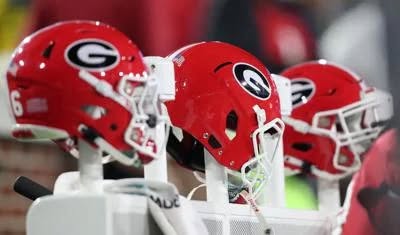**Yet Another Player from the Georgia Bulldogs Has Been Arrested**
The Georgia Bulldogs football program, one of the most storied and successful in college athletics, has found itself in the headlines yet again—but not for reasons related to on-field success. Offensive lineman Jahzare Jackson, a promising talent on the team, was reportedly arrested and charged with possession of a controlled substance. This marks the latest in a string of off-field incidents involving Bulldogs players, raising questions about discipline, accountability, and the culture within the program.
According to law enforcement reports, Jahzare Jackson was taken into custody following a traffic stop where officers allegedly discovered a controlled substance in his possession. While the exact substance has not been officially confirmed by authorities, early reports suggest it may involve marijuana or a more serious narcotic. The quantity found—reportedly enough to warrant a felony charge—has compounded the severity of the situation.
Jackson, a redshirt freshman who joined the Bulldogs with high expectations, now faces legal consequences that could jeopardize not only his football career but also his standing at the University of Georgia. The arrest comes at a time when head coach Kirby Smart has repeatedly emphasized the importance of discipline and making smart decisions off the field.
This incident is far from an isolated one for the Georgia football program. Over the past few years, multiple players have been arrested or suspended for various infractions, ranging from DUI and reckless driving to more serious charges like assault and illegal possession of firearms. While the Bulldogs have maintained their dominance on the field, winning back-to-back national championships in 2021 and 2022, the off-field issues have cast a shadow over the program’s success.
Critics argue that while winning games is important, fostering a culture of responsibility and accountability should be just as much a priority. The repeated arrests have led to scrutiny over whether the program is doing enough to educate and guide its players, especially given the immense pressure and visibility that comes with playing for a top-tier college football team.
For Jackson, this arrest could have significant ramifications. As a young player with potential, he was expected to compete for playing time in the coming seasons. However, a felony charge—depending on the outcome—could lead to suspension or even dismissal from the team. The University of Georgia has a student-athlete conduct policy that often results in immediate suspension pending investigation, meaning Jackson’s status with the Bulldogs is now in serious doubt.
Beyond football, a criminal charge of this nature could affect his academic eligibility, future transfer opportunities, and even his prospects of playing professionally. NFL scouts pay close attention to character concerns, and an arrest like this could severely damage his draft stock down the line.
Head coach Kirby Smart has built a reputation as a disciplinarian who demands excellence both on and off the field. However, the recurring arrests of players under his watch have led to questions about whether the message is getting through. Smart has previously addressed team misconduct by stating that players who don’t adhere to the program’s standards “won’t be here long,” but the frequency of these incidents suggests a deeper issue.
Some analysts believe that the high-pressure environment of competing for championships, combined with the fame and scrutiny that comes with being a Georgia football player, may contribute to poor decision-making among young athletes. Others argue that the program needs to implement stricter preventive measures, such as mandatory counseling, leadership seminars, or more stringent oversight of player behavior.
Jackson’s arrest is not an anomaly in the world of college athletics. Across the country, student-athletes—particularly in high-profile sports like football and basketball—often find themselves in legal trouble. The combination of youth, newfound fame, and the pressures of performing at an elite level can sometimes lead to lapses in judgment.
Universities walk a fine line between supporting their athletes and enforcing consequences for misconduct. While some programs take a hardline stance, immediately dismissing players for legal issues, others attempt rehabilitation and second chances. The debate over how to handle these situations is ongoing, with no clear consensus on the best approach.
The reaction to Jackson’s arrest has been mixed. Some fans have expressed disappointment, arguing that players should know better given the resources and support available to them. Others have called for patience, pointing out that young adults make mistakes and that the legal process should play out before judgment is passed.
However, there is growing frustration among the Bulldog faithful, who fear that these recurring off-field issues could eventually tarnish the program’s reputation. Georgia football is a source of immense pride for the university and its supporters, and incidents like this detract from the team’s accomplishments.
As the legal process unfolds, Jackson’s immediate future hangs in the balance. If convicted, he could face suspension, expulsion, or even jail time, depending on the severity of the charges. The Bulldogs, meanwhile, must decide whether to keep him on the roster or cut ties in an effort to reinforce a zero-tolerance policy.
For the program as a whole, this arrest serves as another wake-up call. While Georgia remains a powerhouse on the field, maintaining that success requires more than just winning games—it demands leadership, accountability, and a commitment to developing players as individuals, not just athletes.
Jahzare Jackson’s arrest is the latest chapter in an ongoing issue for the Georgia Bulldogs. While the team continues to dominate competitively, the off-field incidents threaten to undermine its legacy. For Jackson, the consequences could be career-altering. For the program, it’s another opportunity to reflect on how to better guide its players and ensure that they represent the university with integrity.
As the situation develops, one thing is clear: talent alone is not enough. Character matters, and the Bulldogs must find a way to instill that in their players if they hope to sustain their success without the constant distraction of off-field controversies.



